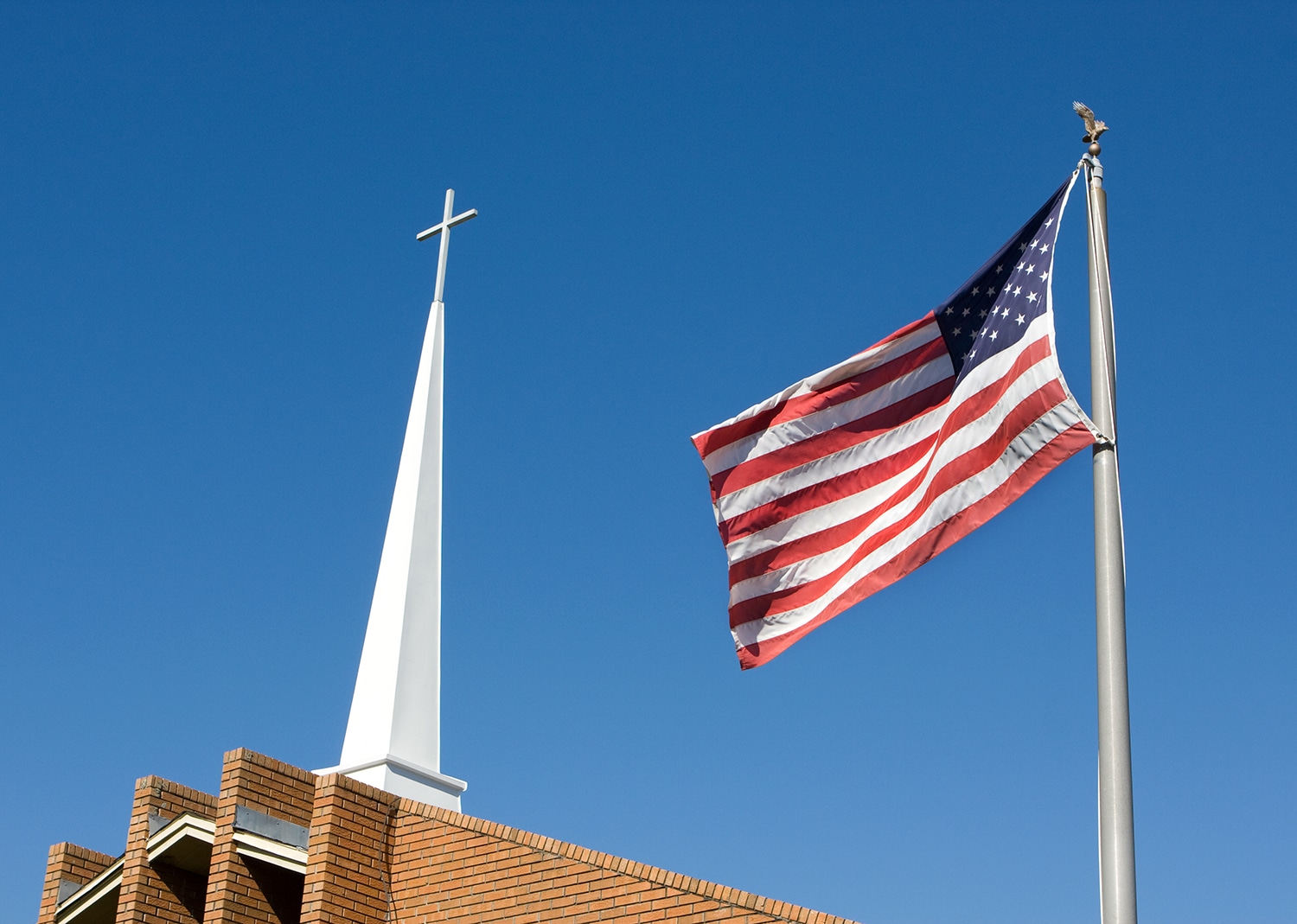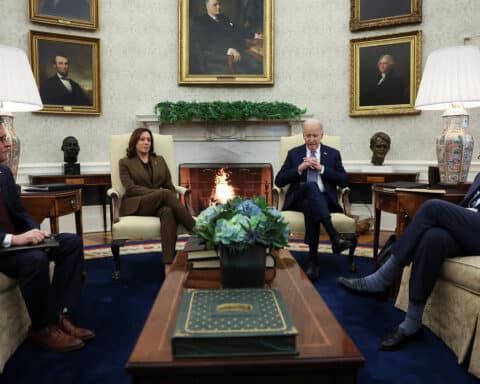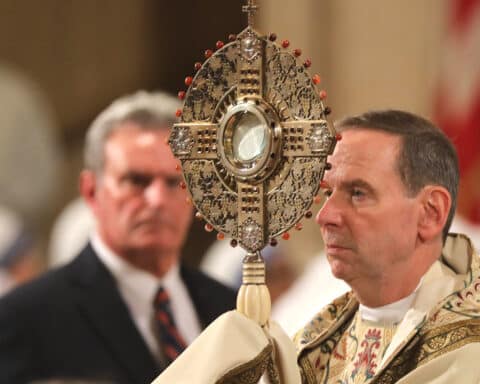In writing about an issue as confused, confusing, and contentious as Christian nationalism, I feel compelled to make something clear at the outset. Christian nationalism, by any accurate definition, is idolatrous heresy. Catholics must reject anything remotely like it and emphatically distance themselves from those who espouse it.
Christian nationalism is the collapse of Christian faith into a very particular sort of divisive, nativist, xenophobic American political identity. It adheres to a specific set of political, legal and policy positions — many of which are contrary to Catholic moral theology — covered by a thin veneer of Christian vocabulary. It is nationalism, yes. But it is not informed by Christian faith and doctrine. It is, in fact, idolatry of a very pernicious sort.
Having said that, however, “Christian nationalism” is often a term used by secular pundits and media commentators to exclude religious belief entirely from public life. It is a lazy shortcut by which pundits paint faithful Christians as dangerous authoritarians intent on imposing a rigid moral agenda on everyone. For these folks, a Christian nationalist is anyone who believes that political positions informed by religious faith have a legitimate place in public policy debates. They wish to banish such voices from the public square under the pejorative “Christian nationalist” label, expelling them beyond the pale of American politics.
Noted evangelical David French uses his Feb. 25 New York Times column, “What is Christian Nationalism, Exactly?” as an attempt to clarify what Christian nationalism is and what it is not. Unfortunately, the column misses the mark in important ways, confusing the issue more than clarifying it. Despite his professed Christian commitments, French elevates liberal political theory over Christian theology as the foundation of his understanding of moral and political life. I don’t point this out to pick on David French. Rather, my intention is to use French as a proxy for how many Christians do the same, including Catholic Christians.
Everyone puts their own moral views first
In an attempt to avoid being “Christian nationalists,” many people subordinate Christian faith to political liberalism. Ironically, this is strikingly similar to what actual Christian nationalists do. In either case, one’s moral life is primarily informed by a political theory, to which Christian faith is either subordinated (liberalism) or subsumed (Christian nationalism). Both are mistakes that we must carefully avoid.
French’s column starts out promisingly by describing what Christian nationalism is not, refuting the bigotry of much secular punditry. “It is not Christian nationalism if a person’s political values are shaped by the individual’s Christian faith,” he correctly notes. “[I]t is no more illegitimate or dangerous for a believer to bring her worldview into a public debate than it is for a secular person to bring his own secular moral reasoning into politics.” French is correct. Opinions to the contrary are precisely those that I criticize above as lazy attempts to exclude religiously informed policy positions from the public square by labeling them Christian nationalism.
But then French starts to get a little fuzzy, eventually contradicting his own very clear statements. In the next paragraph, he identifies Christian nationalism with “the belief that there should be Christian primacy in politics and law.” If this opinion “where to take hold,” he asserts, “it would both upend our Constitution and fracture our society.” In saying this, French, himself, rejects the legitimacy of Christian faith as a proper rule and guide of a variety of reasonable political opinions or systems. Instead, he opts for modern secular Liberalism as the one true opinion, and rejects the legitimacy of any Christian criticism of it.
Everyone believes that his or her moral positions should have “primacy in politics and law.” Everyone. This includes those who claim, like French, that no moral positions should have such primacy. Why? Because their claim is informed by a yet more basic moral position than is expressed in a particular moral assertion or policy proposal. For example, someone might assert that personal opinions about sexual morality should not be imposed upon people who reject that sexual morality. But this claim, itself, is a moral position that such a person believes should have “primacy in politics and law,” and thus be imposed on everyone.
There are no exceptions to this general principle. Politics and law can never exclude every moral position from having primacy. One (or some variations) will always prevail. Politics and law are always about choosing and imposing some moral positions over others. The reason French makes this mistake is that his primary moral commitments — and thus his primary political commitments — are informed by modern secular liberalism rather than historic Christian faith and theology. His mistake is that he fails to see that liberalism is a set of moral propositions that seek political hegemony. That is, they seek to “have primacy in politics and law.”
The conceit of modern secular liberalism, which is French’s fundamental moral starting point, is that it is not a substantive moral position. Rather, the claim is that liberalism is a broad “procedural” system, in which any number of moral positions may compete for primacy. But this necessarily begins with the fundamental moral commitment that this is the exclusively proper form of politics. Which is another way of saying that “it is a belief that there should be [secular liberal] primacy in politics and law.”
Look to the ends of things
The secular liberalism that French embraces begins with the rejection of natural teleology. From the Greek word telos — “end” or “purpose” — this is the position that the human person is created for some purpose and ordered toward some end. It is among the basic tenets of what Catholic Christians call “natural law.” This is not a set of moral propositions. Rather, it is a description of the state of the human person as ordered toward his natural end of life in social community and his supernatural end of rest in God. Actions we ought or ought not to perform are measured by their conformity to these ends. This is compatible with a wide variety of political arrangements. And it endorses none as exclusively compatible. More importantly, a commitment to natural-law-based teleology resists any form of nationalism, whether liberal or “Christian.”
French is very far from alone in this mistaken embrace of secular liberalism as his primary moral commitment. It informs a broad swath of folks in the United States who have sincere faith in the Christian staples of creation, fall and redemption, but whose primary morality is informed by modern classical liberalism. This includes a large number of Catholics, as well as evangelicals for whom the tenets of Christian faith are actually subordinated to the tenets of political liberalism. I don’t gainsay the sincere Christian faith of any of these people. But the moral positions informing their political commitments are liberal, not Christian. And they want these liberal positions to “have primacy in politics and law.”
Applied to the problem of “Christian nationalism,” then, French throws out the Christian baby with the nationalist bathwater. In doing so, he actually embraces another kind of nationalism. It is one that expressly rejects the teleological view of the human person, elevating a particular kind of American liberalism as the proper political arrangement. French ends his column by rightly concluding, “One can welcome Christian participation in the public square while resisting domination, from any faith or creed.” But he fails to see that the moral and political theories he espouses seek an unforgiving and unrelenting domination over all others.





